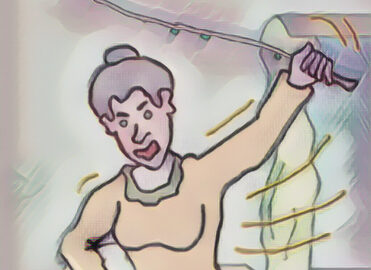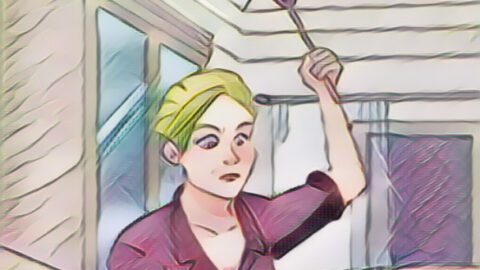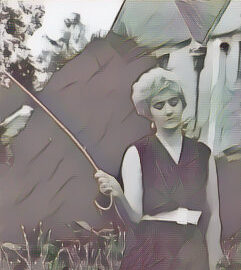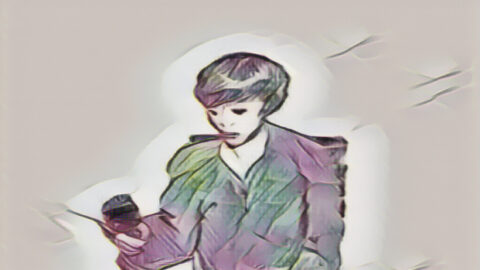My younger brother and I grew up nestled in the heart of a small English village during the 1960s, a place where the air always seemed tinged with the scent of cut grass and woodsmoke, and the days drifted by in a gentle, predictable rhythm. Our home was a modest, red-brick cottage with a wild garden, and the village itself was a patchwork of winding lanes, ancient oaks, and neighbors who all seemed to know your business before you did. Our parents, both products of a sterner, bygone era, held fast to their old-fashioned values. Discipline was the backbone of our household, and while Father was the silent authority, it was Mother who wielded the rod—her word was law, and her presence could fill a room with tension or warmth, depending on her mood.
The world inside our home was a fortress, protective to the point of suffocation. The mere mention of sex was forbidden, a shadowy subject that hovered unspoken in the corners of conversation. Friendships with boys were strictly off-limits, and I remember the way my heart would flutter with curiosity and confusion whenever I caught a boy’s eye at school. I was, in every sense, innocent—naïve to the ways of the world, yet quietly yearning for the mysteries it held. My mother, ever vigilant, seemed to sense this budding curiosity and did everything in her power to stifle it. While other girls paraded about in jeans and patent shoes, I was consigned to plain skirts and sensible cardigans, my hair always brushed and tied back, as if to erase any hint of rebellion or allure.
I can still recall the scratchy feel of those skirts, the way the fabric chafed against my knees as I walked to school, and the envious glances I cast at my classmates in their fashionable attire. My mother’s efforts to keep me “proper” were relentless—she would inspect my clothes each morning, her eyes sharp for any sign of impropriety, her hands quick to smooth a stray wrinkle or tug a hem lower. The scent of starch and lavender clung to my uniform, a constant reminder of the boundaries I was not to cross.
Despite these precautions, there was one boy in my class—Richard—who seemed undeterred by my plainness. He was a quiet, thoughtful boy with a mop of unruly hair and a shy smile that made my cheeks burn. One day, he somehow discovered my address and, in a gesture both innocent and daring, wrote me a letter. The anticipation of receiving a secret note was thrilling, but in our house, privacy was a luxury I could not afford. My parents, ever vigilant, opened and read all my post before it reached my hands. The day Richard’s letter arrived, I found Mother standing in the hallway, her face thunderous, the envelope clutched tightly in her fist.
I never saw the letter’s contents—Mother destroyed it before I could even glimpse the handwriting. But the aftermath was unforgettable. My parents’ reaction was volcanic; I was summoned to the kitchen, where the air crackled with accusation. They demanded to know what I had done to encourage such attention, their voices rising and falling in a symphony of outrage. I was told, in no uncertain terms, that I was to make it clear to Richard that he must never contact me again. The memory of their anger still makes my stomach twist, even now. Later, I learned that they had gone so far as to request the school move me to another class, so deep was their fear of impropriety.
The next morning, my hands trembling, I approached Richard in the schoolyard. The sun was barely up, dew still clinging to the grass, and I could hear the distant laughter of other children as I delivered my message. Richard’s face fell, but he nodded, promising not to write again. I felt a strange mix of relief and guilt, as if I had betrayed a secret part of myself. But fate, it seemed, was not finished with me. Richard confided in a friend, who, finding the whole situation hilarious, decided to send a letter of his own. A few days later, another envelope appeared on our doormat, its arrival heralded by the ominous clang of the letterbox.
That afternoon, I returned home to find Mother waiting for me, her face a mask of fury. The house felt colder, the walls closing in as she launched into a tirade that seemed to last forever. I stood rooted to the spot, my schoolbag slipping from my shoulder, as she accused me of disobedience, of encouraging boys, of bringing shame upon the family. Her words were sharp as thorns, each one pricking my skin and burrowing deep. I tried to protest, to explain, but my voice was drowned out by her anger.
To make matters worse, one of Mother’s friends—a severe woman with pursed lips and a gaze like a hawk—sat in the corner, her presence adding fuel to the fire. She chimed in occasionally, her comments cold and cutting, and I felt as if I were on trial before a jury determined to find me guilty. My brother hovered nearby, wide-eyed and silent, as if afraid that any movement might draw attention to himself. The room was thick with tension, the air heavy with the scent of tea gone cold and the faint tang of furniture polish.
“Clearly, I need to demonstrate what happens to disobedient, wilful little girls like you,” Mother spat, her voice trembling with emotion. I can still see her striding out to the kitchen, her footsteps echoing on the linoleum, and returning moments later with her long, slender cane—a relic she had often threatened to use but never before wielded in anger. The sight of it in her hands made my knees buckle. She flexed the stick, testing its strength, and the swish of it through the air sent a chill racing down my spine.
“Bend over!” she commanded, her tone brooking no argument. My heart pounded in my chest, my breath coming in short, ragged gasps as I obeyed. Tears blurred my vision, hot and shameful, as I bent over the arm of the sofa, my brother and Mother’s friend watching in horrified silence. The humiliation was almost as painful as the fear, my cheeks burning with embarrassment.
“Six of the best,” Mother pronounced, her voice cold and final. “And don’t you dare get up before you’re told to, otherwise we’ll start all over again.” The words hung in the air, heavy as lead. I gritted my teeth, clenching my fists so tightly my knuckles turned white, and braced myself for the first stroke.
The cane landed with a crack that seemed to split the air, a searing line of fire across my skin. The pain was immediate and overwhelming, like being branded with a hot iron. I screamed, unable to hold back, the sound echoing off the walls. Every instinct screamed at me to stand up, to run, but I forced myself to stay still, knowing that any movement would only make things worse.
There was a long, agonizing pause between each stroke. Mother used the time to deliver short, stinging lectures, her words barely registering through the haze of pain. Each stroke was as fierce as the last, and by the end, I was sobbing uncontrollably, my vision swimming with tears. The world had narrowed to the burning ache in my backside and the relentless rhythm of Mother’s voice.
“Right—stand up, girl,” she finally said, her tone softer but no less stern. I straightened slowly, my legs trembling, and wiped my eyes with the back of my hand. I thought my ordeal was over, but Mother’s next words dashed any hope of reprieve. “The next time either of you misbehaves, it’ll be the cane—understand?” she announced, her gaze sweeping over both my brother and me. She returned the cane to its place in the kitchen, the sound of it clattering against the wall lingering in my ears.
But the punishment did not end there. For the rest of the afternoon, I was made to stand in the corner of the living room, my face pressed to the wallpaper, hands on my head. The minutes crawled by, each one stretching into eternity. I could hear the muffled sounds of life continuing around me—the clatter of dishes in the kitchen, the low murmur of conversation, the ticking of the clock on the mantelpiece. My backside throbbed with every heartbeat, and the shame of my predicament was almost unbearable.
The threat of further punishment hung over me like a storm cloud. I knew that when Father returned home, the final verdict would be his. The anticipation was excruciating; every creak of the floorboards, every distant car engine made my heart leap in my chest. I imagined all sorts of terrible outcomes, my mind racing with fear and regret.
When Father finally arrived, the house seemed to hold its breath. Mother wasted no time in recounting my “crimes,” her voice rising and falling in dramatic waves. I remained in the corner, my cheeks burning, listening as they discussed my fate. My brother hovered nearby, silent and pale, as if hoping to disappear into the wallpaper.
At last, after what felt like hours, Father declared that I had been punished enough.



























































